|
In 2024, champions of surveillance reform in the House passed the Fourth Amendment Is Not For Sale Act – which would force government agencies to obtain probable cause warrants before collecting Americans’ most sensitive and personal data scraped from apps and sold by data brokers. House passage of this measure creates powerful momentum for this major surveillance reform, in the next Congress if not in this one. Congress also imposed strong reporting and accountability measures on the FBI. The Bureau must now report the number of times it searches, or “queries,” the communications of Americans in FISA Section 702 databases. This reform amendment also allows the leaders of both Houses of Congress and the House and Senate Judiciary and Intelligence Committees to attend hearings of the secret FISA Court – something Jim Jordan, Chairman of the Judiciary Committee, (R-OH) and Ranking Member Jerry Nadler, (D-NY), are publicly planning to do. Congress did reauthorize Section 702, the foreign intelligence surveillance authority, without requiring warrants to examine queries of the communications of Americans caught up in this global data trawl. Even here, however, there were bright spots. The advocates of the intelligence community avoided a warrant requirement for surveillance of Americans by the narrowest margin – the breaking of a tie vote. And champions of reform succeeded in moving the next reauthorization of Section 702 from five years to two years. As a result of this close vote and narrow window, debate is already well underway on ways to improve Section 702. On the negative side, House Intelligence Committee leaders managed to insert into Section 702 reauthorization a measure we called “Make Everyone a Spy” – now law – that requires many businesses with internet-related communications equipment to allow warrantless inspection of customer data. At this writing, efforts are underway to narrow this provision. Champions of Reform Throughout this year, many Members stepped forward to take a strong, bold stance for surveillance reform. These include:
Other prominent and diligent House surveillance reformers include:
In the Senate:
“Why are House Intelligence Committee Republicans so happy to carry water for the Biden Administration?” This was a question put to us by an incredulous Republican politician. He added: “Why is it that Democrats in the Senate are doing a better job of protecting privacy from the administration and the intelligence community than House Republicans?”
Here is what he was getting at: in April, the House Permanent Select Committee on Intelligence slipped into the reauthorization of Section 702 a measure that would allow the government to potentially enlist almost every kind of business to warrantlessly spy on any American’s communications contained in any kind of electronic communications equipment. Now law, this measure could force ordinary businesses – from gyms to dentists’ offices, to commercial landlords with tenants that could include political campaigns or journalists – to turn over their customers’ communications that run on ordinary systems, such as WiFi. For obvious reasons, this came to be known as the new “Make Everyone a Spy” law. In April, when the Senate prepared to reauthorize FISA Section 702, which authorizes surveillance of foreign targets located abroad, Sen. Mark Warner (D-VA) won the votes of his colleagues by frankly admitting that the House language “could have been drafted better.” He promised that the Senate Intelligence Committee would fix it with a narrower definition of covered “electronic communications service providers.” “The idea that you draw it so broad, and then try to exclude things, well, you’re never going to be able to figure out all the possible exceptions,” Warner said in an interview. True to his word, Sen. Warner led his committee to include language in the Intelligence Authorization Act that narrows the definition of a covered electronic communications service provider. The actual language of the amendment, based on an opinion by the secret FISA Court, is classified. But the Warner fix is widely believed by the media to narrow this law to cover cloud computing centers, which did not exist when the governing law, the Electronic Communications Privacy Act, was enacted in 1986 and amended more than 15 years ago. (Under current law, communication companies, like Google and Verizon, are already required to cooperate with the government on data searches for foreign threats.) That fix, however, fails to impress Rep. Mike Turner (R-Ohio) and other leading Members of the House Intelligence Committee. They are avoiding Sen. Warner’s legislation and seem determined to perpetuate the expansive definition of “Make Everyone a Spy” in the House version of the Intelligence Authorization Act. House insiders tell us that it is now up to Speaker Johnson and reform-minded Republicans to ensure that the Warner fix is made in the House legislation. Absent that, civil liberties champions will have to cross our fingers and hope that the fix will be made in a House-Senate conference committee. If you write legislation but refuse to tell the public what is in it, can it still be considered a law if enacted? Can public laws be redacted, with big black heavy marks through their central provisions?
The Senate Intelligence Committee thinks so. These questions arise from a development that forces civil libertarians to look a gift horse in the mouth. Here’s the background: When Congress passed the reauthorization of Section 702 in April, it included an amendment from the House Intelligence Committee that would force “any provider” of a business service to warrantlessly hand over customer information from any electronic device that transmits data, such as routers or free WiFi. Any businessperson could be dragooned into this service and gagged for life to never reveal it. The public outcry about turning your neighborhood Starbucks into a spying operation prompted legislators to exclude coffee shops, hotels, and community centers. But the amendment, adopted by the Senate, was still expansive enough to define gyms, office complexes, dentists, you name it, as “electronic service providers” covered by this law. Many civil libertarians worried that custodial services would be required to swipe data from servers at night. That may sound paranoid, but the law was expansive enough to allow that – and we’ve seen time and again, give the intelligence community an inch and they will take a continent. That’s why this law was quickly labeled the “Make Everyone a Spy” program. Senate Intelligence Chairman Mark Warner won passage of this amendment only by pledging to his colleagues that his committee would narrow the scope of this provision to one intended sector that was the subject of secret opinions from the Foreign Intelligence Surveillance Court. Sen. Warner deserves great credit for keeping his word and acting on it with alacrity. It is widely believed on Capitol Hill that the legislation is aimed at data centers, not everyday businesses. But we cannot be sure because the new amendment’s new, narrowed definition of a category of covered electronic service provider is classified. So, the good news: The Make Everyone a Spy law is being narrowed to a single category. The bad news: We don’t know what that means. Such secret law is a dangerous practice that will lead to pernicious outcomes. If unchallenged, this precedent will be used by the champions of the intelligence community on Capitol Hill to insert a host of secret provisions. Combine secret law with secret opinions from the secret FISA court, and voilà, you have a complete Star Chamber legal system adjacent to the public one. If this still seems hyperbolic, imagine what it would be like to be on the receiving end of a government request to produce customer information, without being presented with a warrant. Your lawyer can ask: Are we a covered entity within the government’s definition? Or is the government overreaching? There would be no answers to these questions because secret law short circuits due process. If this provision is aimed at data centers, as surely the Russians, Chinese, Iranians, and North Koreans know from reading American media, why not reveal that fact? The best outcome would be for the Senate to strip out the secrecy and let us know who is and who is not covered by this law. The House of Representatives on Thursday passed the CBDC Anti-Surveillance State Act, 216-192, a measure sponsored by House Majority Whip Tom Emmer (R-MN) that would prohibit the Federal Reserve from issuing a central bank digital currency (CBDC) that would give the federal government the ability to monitor and control individual Americans’ spending habits.
“A digital dollar could give the FBI and other federal agencies instant, warrantless access to every transaction of any size made between Americans,” said Bob Goodlatte, former congressman and PPSA Senior Policy Advisor. “This would be an alarming and unacceptable invasion of our Fourth Amendment right to privacy. The CBDC Anti-Surveillance State Act takes a critical step to prevent this from happening. We applaud Rep. Emmer for his leadership in protecting Americans against pervasive government surveillance of our financial data.” Perhaps next the House will consider measures to rein in financial surveillance by the U.S. Treasury and the Financial Crimes Enforcement Network (FinCEN). Passage by the House of the CBDC Anti-Surveillance State Act is an encouraging sign that more Members and their constituents are learning about the government’s financial surveillance and are ready to push back. “You are being watched, and though we are on the other side of the planet, we can still reach you." Amnesty International released a report based on interviews with 32 Chinese students, including 12 from Hong Kong, studying in universities in eight countries – from the United States to Belgium, Canada, France, Germany, the Netherlands, Switzerland, and the United Kingdom.
Sarah Brooks, Amnesty International’s China Director, said that even when Chinese students study thousands of miles from home, many live in fear. “The Chinese authorities’ assault on human rights activism is playing out in the corridors and classrooms of the many universities that host Chinese and Hong Kong students,” she said. A typical story was told by a student who attended a commemoration of the 1989 Tiananmen Square massacre. She was careful not to share her real name with anyone involved in the protest or to post anything online. Yet, a few hours later she heard from her father in China, who had been grilled by security officials. Such surveillance could possibly be performed by a quick study of online images. About one-half of Amnesty’s interviewees said they had been photographed or recorded at events by someone present at the protest. The only conclusion to draw from this is that China has enough spies in the United States and Western countries to show up and shadow protest events. Many students said they censor themselves online – even in the classroom – due to the perceived risk their comments and opinions will be reported. One-third of students said they changed the focus of their studies or dropped out of planned academic careers because of this pressure. “Threats made to family members in mainland China included to revoke their passports, get them fired from their jobs, prevent them from receiving promotions and retirement benefits, or even limiting their physical freedom,” Amnesty reports. In some instances, families have been pressured to cut off financial support for their children. More than one-half of the students interviewed said they suffered mental health issues linked to their fears, ranging from stress and trauma to paranoia and depression. One case led to hospitalization. Western universities have been slow to recognize and counter these threats to students. Some academics have even sided with China against dissident students. Amnesty reports that a student was dropped by a Western university researcher on a project after learning that she had participated in a protest critical of China. “The impact of China’s transnational repression poses a serious threat to the free exchange of ideas that is at the heart of academic freedom, and governments and universities must do more to counter it,” Brooks said. Universities need to be fully aware of the threat of surveillance and retaliation against their students from China. The U.S. government must also take countermeasures to stop Chinese surveillance of students in the United States, even if this means expelling diplomats or tracking others who surveil and harass students exercising their right to free speech. We must also be aware of the dangers of purchased or posted data and videos that expose Chinese students to harm. Amnesty’s report is a reminder that that in the United States, it is not just the U.S. federal government that surveils Americans and visitors to our shores. There is a mystery at the heart of the recently enacted law that broadens the definition of an “electronic communications service provider” with a duty to carry out secret surveillance at the request of the government.
Such compelled surveillance requirements were once focused on major companies, like Verizon, AT&T, and Google. But then came a secret case that led the intelligence community to want to expand the law to cover, well, almost everyone in business. This new law, increasingly known by its moniker “Make Everyone a Spy Act,” can now enlist business owners into copying the communications of their customers and handing them over to the FBI or some other government agency. What prompted the intelligence community to want such a dramatic expansion of covered entities? Senate Intelligence Committee Chairman Mark Warner said on the Senate floor in April: “Now, why has this suddenly now become such an issue? Well, one of those communications providers – remember I talked about clouds, data centers, how these networks come together and how network traffic is intertangled at these data centers? One of these entities that controlled one of those new enterprises that didn’t exist in 2008 said: Well, hold it. You can’t compel us to work with the American government because we don’t technically fit the definition of an electronic communications service provider. And the fact was, the company that raised that claim won in court. So what happened was, the FISA Court said to Congress: You guys need to close this loophole; you need to close this and change this definition.” Yet the new law is insanely broad. It covers “any” service provider with access to communications equipment. The government can now enlist custodial services, landlords, owners of small office complexes, gyms, dentist offices, and small businesses of almost every kind, as government spies. And, as with the larger telecoms and tech companies, these small businesses will be held under a gag order, preventing them from alerting their customers that they’ve been spied on. Worse, because few small business owners have the ability to neatly parse exact threads of communications from their equipment, they will likely just turn over the equipment itself – and every customers’ private data it contains – to the NSA. Little wonder that Sen. Ron Wyden (D-OR) described this sweeping provision as “one of the most dramatic and terrifying expansions of government surveillance authority in history.” Sen. Warner admitted that the provision “could have been drafted better.” He promised that if the Senate passed the bill, he would support a redraft of this law’s language in the next Intelligence Authorization Act or the National Defense Authorization Act. The Senate took him at his word and passed the bill. But how can such a redraft be done without some guidance as to the nature of the case that prompted this new law? Without a public disclosure of the type of service provider at the heart of the case Sen. Warner referred to, Congress cannot effectively narrow the language. The administration must declassify the type of provider in the FISC case to guide Congress in making precise refinements in its narrowing of the law. For that reason, PPSA is joining a host of civil liberties peer organizations – ranging from the American Civil Liberties Union and Brennan Center to the Due Process Institute and FreedomWorks – in an open letter to Attorney General Merrick Garland and Director of National Intelligence Avril Haines urging them to declassify the type of service provider at the heart of the FISC case. The administration issued a written commitment to apply the new definition only to the type of provider at issue in the FISC decision. The recent history of American surveillance shows, however, that such commitments won’t bind future administrations. And time and again, we’ve seen one agency or another in the intelligence community resort to legal sophistry to break its word. Given that data centers were named by Sen. Warner on the Senate floor and even in a New York Times article, foreign spies are surely aware of the nature of the broad outlines of the case behind this new law. It is hard to imagine a stronger case for discretionary declassification. Disclosure must happen so Congress can curtail this new warrantless surveillance legislation in the narrowest way possible. We needed a little perspective before reporting on the historic showdown on the reauthorization of FISA Section 702 that ended on April 19 with a late-night Senate vote. The bottom line: The surveillance reform coalition finally made it to the legislative equivalent of the Super Bowl. We won’t be taking home any Super Bowl rings, but we made a lot of yardage and racked up impressive touchdowns.
For years, PPSA has coordinated with a wide array of leading civil liberties organizations across the ideological spectrum toward that key moment. We worked hard and enjoyed the support of our followers in flooding Congress with calls and emails supporting privacy and surveillance reform. So what was the result? We failed to get a warrant requirement for Section 702 data but came within one vote of winning it in the House. There was a lot of good news and new reforms that should not be overlooked. And where the news was bad, there are silver linings that gleam.
We come out of this legislative fracas bloodied but energized. We put together a durable left-right coalition in which House Judiciary Committee Chairman Jim Jordan and Ranking Member Jerry Nadler, as well as the heads of the Freedom and Progressive caucuses, who worked side-by-side. For the first time, our surveillance coalition had the intelligence community and their champions on the run. We lost the warrant provision for Section 702 only by a tie vote. Had every House Member who supported our position been in attendance, we would have won. This bodes well for the next time Section 702 reauthorization comes up. We will be ready. Let’s not forget that a recent bipartisan YouGov poll shows that 80 percent of Americans support warrant requirements. We sense a gathering of momentum – and we look forward to preparing for the next big round in April 2026. PPSA Calls on Senate to End Data Purchases The House voted 219-199 to pass the Fourth Amendment Is Not For Sale Act, which requires the FBI and other federal agencies to obtain a warrant before they can purchase Americans’ personal data, including internet records and location histories.
“Every American should celebrate this strong victory in the House of Representatives today,” said Bob Goodlatte, former House Judiciary Chairman and PPSA Senior Policy Advisor. “We commend the House for stepping up to protect Americans from a government that asserts a right to purchase the details of our daily lives from shady data brokers. This vote serves notice on the government that a new day is dawning. It is time for the intelligence community to respect the will of the American people and the authority of the Fourth Amendment.” Federal agencies, from the FBI to the IRS, ATF, and the Departments of Defense and Homeland Security, for years have purchased Americans’ sensitive, personal information scraped from apps and sold by data brokers. This practice is authorized by no specific statute, nor conducted under any judicial oversight. “The Fourth Amendment Is Not For Sale Act puts an end to the peddling of Americans’ private lives to the government,” said Gene Schaerr, general counsel of PPSA. “Eighty percent of the American people in a recent YouGov poll say they believe warrants are absolutely necessary before their digital lives can be reviewed by the government. It is now the duty of the U.S. Senate to finish the job and express the will of the people.” PPSA is grateful to Rep. Warren Davidson, House Judiciary Chairman Jim Jordan, Ranking Member Jerry Nadler, Reps. Andy Biggs, Rep. Pramila Jayapal, Rep. Zoe Lofgren, Rep. Thomas Massie, Rep. Sara Jacobs, and many others who worked to persuade Members to pass this bill in such a strong bipartisan victory. Much of the credit also goes to PPSA’s followers, thousands of whom called and emailed Members of the House at a critical time. “We will need you again when the Fourth Amendment Is Not For Sale Act goes to the Senate,” Schaerr said. “Stay tuned.” That a warrant requirement for Section 702 came within one vote of passing the House on Friday is a testament to the strong advocacy of its sponsors – Rep. Andy Biggs, Rep. Pramila Jayapal, Chairman Jim Jordan, Ranking Member Jerry Nadler, Rep. Warren Davidson, and Rep. Zoe Lofgren.
PPSA is also grateful to Rep. Chip Roy, who sponsored an amendment that requires the FBI to give Congress a quarterly report on the number of U.S. person queries conducted. This accountability measure, coupled with the shortening of the reauthorization of Section 702 from five years to two years, will greatly strengthen oversight of the FBI. Further good news came from the passage of an amendment offered by Rep. Ben Cline, Rep. Jackson Lee, Rep. Andy Biggs, and Rep. Darrell Issa. The House voted to permanently ban the intelligence practice of “abouts” collection in which Americans were targeted for merely being mentioned in a communication. Abuse of “abouts” collection prompted the FISA Court to publicly excoriate the National Security Agency for an “institutional lack of candor” about a “very serious Fourth Amendment issue.” Now the intelligence community will not be able to revive that measure. Thanks to this bipartisan honor roll of surveillance reform champions, Congressional oversight will be strengthened, and the threat of “abouts” collection is history. An amendment to require the FBI and other federal agencies to obtain a probable cause warrant before accessing Americans’ communications under FISA Section 702 fell one vote short in the U.S. House of Representatives on Friday.
This was a disappointment, made worse by an expansion of the government’s surveillance powers contained in the bill. The House vote includes a change in the definition of an electronic communication service provider to require a whole new range of businesses to assist the government in its spying. But there was also good news. Pressure from reformers did succeed in changing Section 702 reauthorization from five years to two years. The House also passed a measure from Rep. Chip Roy (R-TX) that requires the FBI to give Congress a quarterly report on the number of U.S. person queries conducted. The combination of a shorter period before the next reauthorization and the strengthened oversight of the FBI should serve notice on the FBI and other agencies not to return to their lax treatment of Americans’ privacy and constitutional rights. Reform received another win on Friday with the passage of an amendment sponsored by Rep. Ben Cline (R-VA) that makes permanent the suspended intelligence practice of “abouts” collection, in which Americans were targeted for merely being mentioned in a communications. Abuse of “abouts” collection prompted the FISA Court to publicly excoriate the National Security Agency for an “institutional lack of candor” about a “very serious Fourth Amendment issue.” PPSA joins our civil liberties peers in calling on the Senate to reject any reauthorization that continues Section 702 programs without a warrant requirement for Americans. A recent YouGov poll shows that almost 80 percent of Americans support the warrant requirement. The signals for reform are growing stronger – the American people and a growing coalition in Congress have had enough of Washington’s surveillance abuse. The reform coalition on Capitol Hill remains determined to add strong amendments to Section 702 of the Foreign Intelligence Surveillance Act (FISA). But will they get the chance before an April 19th deadline for FISA Section 702’s reauthorization?
There are several possible scenarios as this deadline closes. One of them might be a vote on the newly introduced “Reforming Intelligence and Securing America” (RISA) Act. This bill is a good-faith effort to represent the narrow band of changes that the pro-reform House Judiciary Committee and the status quo-minded House Permanent Select Committee on Intelligence could agree upon. But is it enough? RISA is deeply lacking because it leaves out two key reforms.
The bill does include a role for amici curiae, specialists in civil liberties who would act as advisors to the secret FISA court. RISA, however, would limit the issues these advisors could address, well short of the intent of the Senate when it voted 77-19 in 2020 to approve the robust amici provisions of the Lee-Leahy amendment. For all these reasons, reformers should see RISA as a floor, not as a ceiling, as the Section 702 showdown approaches. The best solution to the current impasse is to stop denying Members of Congress the opportunity for a straight up-or-down vote on reform amendments. The reauthorization of FISA Section 702, which allows federal agencies to conduct international surveillance for national security purposes, has languished in Congress like an old Spanish galleon caught in the doldrums. This happened after opponents of reform pulled Section 702 reauthorization from the House floor rather than risk losing votes on popular measures, such as requiring government agencies to obtain warrants before surveilling Americans’ communications.
But the winds are no longer becalmed. They are picking up – and coming from the direction of reform. Sen. Dick Durbin (D-IL), Chairman of the Senate Judiciary Committee, and fellow committee member Sen. Mike Lee (R-UT), today introduced the Security and Freedom Enhancement (SAFE) Act. This bill requires the government to obtain warrants or court orders before federal agencies can access Americans’ personal information, whether from Section 702-authorized programs or purchased from data brokers. Enacted by Congress to enable surveillance of foreign targets in foreign lands, Section 702 is used by the FBI and other federal agencies to justify domestic spying. According to the Foreign Intelligence Surveillance Act (FISA) Court, under Section 702 government “batch” searches have included a sitting U.S. Congressman, a U.S. Senator, journalists, political commentators, a state senator, and a state judge who reported civil right violations by a local police chief to the FBI. It has even been used by government agents to stalk online romantic prospects. Millions of Americans in recent years have had their communications compromised by programs under Section 702. The reforms of the SAFE Act promise to reverse this trend, protecting Americans’ privacy and constitutional rights from the government. The SAFE Act requires:
Durbin-Lee is a pragmatic bill. It lifts warrants and other requirements in emergency circumstances. The SAFE Act allows the government to obtain consent for surveillance if the subject of the search is a potential victim or target of a foreign plot. It allows queries designed to identify targets of cyberattacks, where the only content accessed and reviewed is malicious software or cybersecurity threat signatures. The SAFE Act is a good-faith effort to strike a balance between national security and Americans’ privacy. It should break the current stalemate, renewing the push for debate and votes on amendments to the reauthorization of Section 702. Does the intelligence community have a secret veto?Time and again, the forces of the surveillance status quo have prevented Congress from voting on reforms of FISA Section 702 – the authority passed by Congress to allow the government to track foreign threats but has been used in recent years to surveil millions of ordinary Americans.
The intelligence community especially doesn’t want Congress to demand closure of the loophole that allows the government to purchase your most sensitive and personal information from data brokers. Federal agencies can use this data to accumulate a portfolio of your health and medical issues, personal life, financial concerns, religious beliefs and worship, and political posts and activities. Repeated attempts by the U.S. House of Representatives to debate and hold a floor vote on these reform amendments to Section 702 have been stalled by legislative maneuvers and gamesmanship. At the same time, the government has applied to the FISA Court to extend Section 702 without reforms for a whole year, which could elbow Congress out of the policy process entirely. While Congress struggles, a poll conducted by YouGov, commissioned by FreedomWorks and DemandProgress, show the American people – Republicans, Democrats, and independents – are paying attention and they do not like what they see:
In the reauthorization of Section 702, Americans demand that Congress:
Members of Congress are now asking themselves: If I allow these domestic surveillance programs to continue, how am I going to explain this my constituents? You can help clarify this issue for your Member of Congress. Tell your U.S. House Representative: “Stop the FBI and other government agencies from spying on innocent Americans. Please fight for a vote to reform FISA’s Section 702 with warrant requirements, both for Section 702 data and for our sensitive, personal information sold to the government by data brokers.” Ken Blackwell, former ambassador and mayor of Cincinnati, has a conservative resume second to none. He is now a senior fellow of the Family Research Council and chairman of the Conservative Action Project, which organizes elected conservative leaders to act in unison on common goals. So when Blackwell writes an open letter in Breitbart to Speaker Mike Johnson warning him not to try to reauthorize FISA Section 702 in a spending bill – which would terminate all debate about reforms to this surveillance authority – you can be sure that Blackwell was heard.
“The number of FISA searches has skyrocketed with literally hundreds of thousands of warrantless searches per year – many of which involve Americans,” Blackwell wrote. “Even one abuse of a citizen’s constitutional rights must not be tolerated. When that number climbs into the thousands, Congress must step in.” What makes Blackwell’s appeal to Speaker Johnson unique is he went beyond including the reform efforts from conservative stalwarts such as House Judiciary Committee Chairman Jim Jordan and Rep. Andy Biggs of the Freedom Caucus. Blackwell also cited the support from the committee’s Ranking Member, Rep. Jerry Nadler, and Rep. Pramila Jayapal, who heads the House Progressive Caucus. Blackwell wrote: “Liberal groups like the ACLU support reforming FISA, joining forces with conservatives civil rights groups. This reflects a consensus almost unseen on so many other important issues of our day. Speaker Johnson needs to take note of that as he faces pressure from some in the intelligence community and their overseers in Congress, who are calling for reauthorizing this controversial law without major reforms and putting that reauthorization in one of the spending bills that will work its way through Congress this month.” That is sound advice for all Congressional leaders on Section 702, whichever side of the aisle they are on. In December, members of this left-right coalition joined together to pass reform measures out of the House Judiciary Committee by an overwhelming margin of 35 to 2. This reform coalition is wide-ranging, its commitment is deep, and it is not going to allow a legislative maneuver to deny Members their right to a debate. PPSA, in concert with a coalition of major civil liberties groups from the left, right, and center, is appealing to Members of Congress “to oppose any legislative end-run that allows the FBI and other intelligence agencies to continue to spy on Americans without giving Congress the opportunity to vote on reforms.”
The word from Capitol Hill is that the intelligence community is now lobbying to attach a reauthorization of FISA Section 702 to a “must-pass” spending measure. Such a maneuver would cement the intelligence community’s strategy of denying Members of Congress a chance to have a debate and to vote on reforms to this surveillance authority. Our letter, which includes Americans for Prosperity, the Brennan Center for Justice, Demand Progress, FreedomWorks, and the Wikimedia Foundation, warns Congress: “The Fourth Amendment will become a constitutional dead letter if the government can continue to track our every movement, communications, where we worship, our financial and health issues, what we believe, and our political activity without warrants.” Our letter concludes: “Congress must be able to vote on reforms rather than being faced with a ‘take-it-or-leave-it’ choice between funding the government and protecting Americans’ liberties.” Our FISA Reform Coalition letter ended by urging Congress to stand up for Americans’ privacy, the Constitution, and against the insulting premise that Members of Congress should not be allowed to vote on surveillance reform. Tell your Representative in the U.S. House that you want the FBI and other federal intelligence agencies to stop spying on you and your family.
In recent years, the FBI and other agencies have freely dipped into Americans’ private communications and data caught up in foreign surveillance. The FBI, IRS, Drug Enforcement Administration, Pentagon, and other agencies also track your every move by purchasing your geolocation data and other sensitive, personal information scraped from the apps on your cellphone and sold to the government by shady data brokers. Your personal information from these sources tells the FBI where you’ve been and where you’re going, where you worship, who you date or have fun with, and all about your health, financial information, personal beliefs, and political activities. Do you trust this government to have so much power over your life? Consider that the FBI has already been caught dipping into Americans’ personal communications in recent years by the millions. The government has followed our political and religious activities for years without warrants, spied on 19,000 donors to a Congressional campaign, and spied on a state senator, a state judge, a U.S. Congressman, and U.S. Senator. If judges and Members of Congress can have their rights violated, imagine how much respect the FBI and other government agencies have for your privacy. For now, champions of the intelligence community on Capitol Hill have used a legislative maneuver to prevent a vote that would require the government to get warrants before looking at your private information. The FBI and their friends know that if these amendments get a fair vote on the House floor, they will lose. So they’ve upended the whole process. This is dirty pool. The lack of a vote denies your Member of Congress the right to debate and vote for reform. Unchallenged, this maneuver ensures that the FBI and other agencies will continue to ignore the Fourth Amendment to the U.S. Constitution, which clearly mandates that the government go to a court and obtain a warrant before your personal communications can be inspected. So tell your U.S. House Representative to demand that the FBI and other federal agencies stop accessing your private, personal communications and data without a warrant. Tell your U.S. House Representative: “Stop the FBI from spying on innocent Americans. Please fight for a vote to reform FISA’s Section 702 with warrant requirements, both for Section 702 data and for our sensitive, personal information sold to the government by data brokers.” From Gene Schaerr, general counsel of the Project for Privacy and Surveillance Accountability:
“For months, the House Intelligence Committee warned that failure to reauthorize Section 702 would subject the American homeland to unprecedented danger. “Now the Intelligence Committee has caused the bill to be pulled rather than allow the House to work its will and vote on a few reasonable and important reform amendments. “They are now willing to endanger Section 702 in its entirety unless they get everything they want. “Think about it – the intelligence community and deep state are so determined to maintain the ability to spy on Americans that they are willing to put at risk the very authority they claim they need to protect us against foreign threats.” Long before the founding of the United States, religious refugees flooded into America to escape the Star Chamber, the Inquisition, the persecutions, and wars over religious doctrine that made worship in the Old World a dangerous activity. Millions wanted relief from the incessant surveillance – exemplified by William Laud, Charles I’s Archbishop of Canterbury – that often relied on spies dispatched to listen to sermons with sharp ears for anything out of line with official orthodoxy.
As the House of Representatives prepares to decide whether to include surveillance reforms in the reauthorization of Section 702 of the Foreign Intelligence Surveillance Act, there are serious implications for the free practice of religion in America. House Speaker Mike Johnson made this clear in an interview late last year when he addressed the FBI’s surveillance of traditional Catholics as possible terrorists, and the targeting of pro-life activists like Mark Hauck, whose wife and seven children watched in terror as an FBI SWAT team broke down their front door and pointed five guns at his head over a supposed violation of the Freedom of Access to Clinic Entrances Act. “I’ve made it very clear that, in my view, the evidence shows that, the FBI, for example, in the last couple of years has been weaponized,” Speaker Johnson told The Daily Signal. “We have the evidence to show it. They have, in some cases, targeted people of faith. They’ve targeted conservative Catholics and concerned parents at school board meetings … that’s what happened.” Alex Marthews of Restore the Fourth documents abuses of religious rights from church- organized civil rights protests in the 1960s to the surveillance of patriotic, law-abiding Muslims today. We recently reported on the creepy surveillance of Calvary Chapel in San Jose, California. Such government snooping into religious expression is enabled by two massive databanks that the government freely dips into without a warrant. One is Section 702, an authority that allows the surveillance of foreign targets located abroad, but incidentally collects the communications of millions of Americans. The FBI has dipped into this ocean of Americans’ communications millions of times in recent years without warrants. The other database is the commercial purchase of our most sensitive and personal information scraped from apps and sold to the FBI, IRS, Department of Homeland Security, and many other agencies. This, too, is information the government holds and freely accesses, all without a warrant. There are deep implications for the character of our nation in the growth of warrantless surveillance. Religious scholar David Lyon writes of the modern replacement of the idea of a God, who watches his creation with deep and loving concern, with the state’s Algorithm, replacing eternal joy with a perpetual living death. Or to put it in secular terms, this is the vision of George Orwell of a boot stamping on a human face forever. Any House Member who values the freedom to worship as one wishes, or not to worship at all, should take a stand for religious freedom by requiring warrants before the FBI or any other governmental agency can freely inspect our beliefs, values, and activities. This is not a new or radical notion. The founders wrote the warrant requirement into the Fourth Amendment to the Constitution to set us apart from Old World ways. Let us not go back. The word from Capitol Hill is that Speaker Mike Johnson is scheduling a likely House vote on the reauthorization of FISA’s Section 702 this week. We are told that proponents and opponents of surveillance reform will each have an opportunity to vote on amendments to this statute.
It is hard to overstate how important this upcoming vote is for our privacy and the protection of a free society under the law. The outcome may embed warrant requirements in this authority, or it may greatly expand the surveillance powers of the government over the American people. Section 702 enables the U.S. intelligence community to continue to keep a watchful eye on spies, terrorists, and other foreign threats to the American homeland. Every reasonable person wants that, which is why Congress enacted this authority to allow the government to surveil foreign threats in foreign lands. Section 702 authority was never intended to become what it has become: a way to conduct massive domestic surveillance of the American people. Government agencies – with the FBI in the lead – have used this powerful, invasive authority to exploit a backdoor search loophole for millions of warrantless searches of Americans’ data in recent years. In 2021, the secret Foreign Intelligence Surveillance Court revealed that such backdoor searches are used by the FBI to pursue purely domestic crimes. Since then, declassified court opinions and compliance reports reveal that the FBI used Section 702 to examine the data of a House Member, a U.S. Senator, a state judge, journalists, political commentators, 19,000 donors to a political campaign, and to conduct baseless searches of protesters on both the left and the right. NSA agents have used it to investigate prospective and possible romantic partners on dating apps. Any reauthorization of Section 702 must include warrants – with reasonable exceptions for emergency circumstances – before the data of Americans collected under Section 702 or any other search can be queried, as required by the U.S. Constitution. This warrant requirement must include the searching of commercially acquired information, as well as data from Americans’ communications incidentally caught up in the global communications net of Section 702. The FBI, IRS, Department of Homeland Security, the Pentagon, and other agencies routinely buy Americans’ most personal, sensitive information, scraped from our apps and sold to the government by data brokers. This practice is not authorized by any statute, or subject to any judicial review. Including a warrant requirement for commercially acquired information as well as Section 702 data is critical, otherwise the closing of the backdoor search loophole will merely be replaced by the data broker loophole. If the House declines to impose warrants for domestic surveillance, expect many politically targeted groups to have their privacy and constitutional rights compromised. We cannot miss the best chance we’ll have in a generation to protect the Constitution and what remains of Americans’ privacy. Copy and paste the message below and click here to find your U.S. Representative and deliver it: “Please stand up for my privacy and the Fourth Amendment to the U.S. Constitution: Vote to reform FISA’s Section 702 with warrant requirements, both for Section 702 data and for our sensitive, personal information sold to government agencies by data brokers.” No sooner did the Protect Liberty and End Warrantless Surveillance Act pass the House Judiciary Committee with overwhelming bipartisan support than the intelligence community began to circulate what Winston Churchill in 1906 politely called “terminological inexactitudes.”
The Protect Liberty Act is a balanced bill that respects the needs of national security while adding a warrant requirement whenever a federal agency inspects the data or communications of an American, as required by the Fourth Amendment. This did not stop defenders of the intelligence community from claiming late last year that Section 702 reforms would harm the ability of the U.S. government to fight fentanyl. This is remarkable, given that the government hasn’t cited a single instance in which warrantless searches of Americans’ communications proved useful in combating the fentanyl trade. Nothing in the bill would stop surveillance of factories in China or cartels in Mexico. If an American does become a suspect in this trafficking, the government can and should seek a probable cause warrant, as is routinely done in domestic law enforcement cases. No sooner did we bat that one away than we heard about fresh terminological inexactitudes. Here are two of the latest bits of disinformation being circulated on Capitol Hill about the Protect Liberty Act. Intelligence Community Myth: Members of Congress are being told that under the Protect Liberty Act, the FBI would be forced to seek warrants from district court judges, who might or might not have security clearances, in order to perform U.S. person queries. Fact: The Protect Liberty Act allows the FBI to conduct U.S. person queries if it has either a warrant from a regular federal court or a probable cause order from the FISA Court, where judges have high-level security clearances. The FBI will determine which type of court order is appropriate in each case. Intelligence Community Myth: Members are being told that under the Protect Liberty Act, terrorists can insulate themselves from surveillance by including a U.S. person in a conversation or email thread. Fact: Under the Protect Liberty Act, the FBI can collect any and all communications of a foreign target, including their communications with U.S. persons. Nothing in the bill prevents an FBI agent from reviewing U.S. person information the agent encounters in the course of reviewing the foreign target’s communications. In other words, if an FBI agent is reading a foreign target’s emails and comes across an email to or from a U.S. person, the FBI agent does not need a warrant to read that email. The bill’s warrant requirement applies in one circumstance only: when an FBI agent runs a query designed to retrieve a U.S. person’s communications or other Fourth Amendment-protected information. That is as it should be under the U.S. Constitution. As we face the renewed debate over Section 702 – which must be reauthorized in the next few months – expect the parade of untruths to continue. As they do, PPSA will be here to call them out. “Once again, the House has passed the Protect Reporters from Exploitive State Spying (PRESS) Act with unanimous, bipartisan support. Forty-nine states have press shield laws protecting journalists and their sources from the prying eyes of prosecutors. The federal government does not. From Fox News to The New York Times, government has surveilled journalists in order to catch their sources. Journalists have been held in contempt and even jailed for bravely safeguarding the trust of their sources.
“The PRESS Act corrects this by granting a privilege to protect confidential news sources in federal legal proceedings, while offering reasonable exceptions for extreme situations. Such laws work well for the states and would safeguard Americans’ right to evaluate claims of secret wrongdoing for themselves. “Great credit goes to Rep. Kevin Kiley and Rep. Jamie Raskin for lining up bipartisan support for this reaffirmation of the First Amendment. As in 2022, the last time the House passed this act, the duty now shifts to the U.S. Senate to respond to this display of unanimous, bipartisan support. I am optimistic. At a time of gridlock, enacting this bill into law would be a positive message that would reflect well on every Senator.” CVS, Kroger, and Rite Aid Hand Over Americans’ Prescriptions Records to Police Upon Request1/17/2024
Three of the largest pharmaceutical chains – CVS Health, Kroger, and Rite Aid – routinely hand over the prescription and medical records of Americans to police and government agencies upon request, no warrant required.
“Americans' prescription records are among the most private information the government can obtain about a person,” Sen. Ron Wyden (D-OR), and Reps. Pramila Jayapal (D-WA) and Sara Jacobs (D-CA) wrote in a letter to HHS Secretary Xavier Becerra revealing the results of a congressional investigation into this practice. “They can reveal extremely personal and sensitive details about a person’s life, including prescriptions for birth control, depression or anxiety medications, or other private medical conditions.” The Washington Post reports that because the chains often share records across all locations, a pharmacy in one state can access a person’s medical history from states with more restrictive laws. Five pharmacies – Amazon, Cigna, Optum Rx, Walmart, and Walgreens Boots Alliance – require demands for pharmacy records by law enforcement to be reviewed by legal professionals. One of them, Amazon, informs consumers of the request unless hit with a gag order. All the major pharmacies will release customer records, however, if they are merely given a subpoena issued by a government agency rather than a warrant issued by a judge. This could be changed by corporate policy. Sen. Wyden and Reps. Jayapal and Jacobs urge pharmacies to insist on a warrant rather than comply with a request or a subpoena. Most Americans are familiar with the strict privacy provisions of the Health Insurance Portability and Accountability Act (HIPAA) from filling out forms in the doctor’s office. Most will surely be surprised how HIPAA, as strict as it is for physicians and hospitals, is wide open for warrantless inspection by the government. This privacy vulnerability is just one more example of the generous access government agencies have to almost all of our information. Intelligence and law enforcement agencies can know just about everything about us through purchases of our most sensitive and personal information reaped by our apps and sold to the government by data brokers. As privacy champions in Congress press HHS to revise its HIPAA regulations to protect Americans’ medical data from warrantless inspection, Congress should also close all the loopholes by passing the Protect Liberty and End Warrantless Surveillance Act. Man proposes, God disposes, but Congress often just kicks the can down the road.
Throughout 2023, PPSA and our civil liberties allies made the case that Section 702 of the Foreign Intelligence Surveillance Act – enacted by Congress to give federal intelligence agencies the authority to surveil foreign threats abroad – has become a convenient excuse for warrantless domestic surveillance of millions of Americans in recent years. With Section 702 set to expire, the debate over reauthorizing this authority necessarily involves reforms and fixes to a law that functions in a radically different way than its Congressional authors imagined. In December, a strong bipartisan majority in the House Judiciary Committee passed a well-crafted bill to reauthorize FISA Section 702 – the Protect Liberty and End Warrantless Surveillance Act. This bill mandates a robust warrant requirement for U.S. person searches. It curtails the common government surveillance technique of “reverse targeting,” which uses Section 702 to work backwards to target Americans without a warrant. It also closes the loophole that allows government agencies to buy access to Americans’ most sensitive and personal information scraped from our apps and sold by data brokers. And the Protect Liberty Act requires the inclusion of lawyers with high-level clearances who are experts in civil liberties to ensure the secret FISA Court hears from them as well as from government attorneys. The FISA Reform and Reauthorization Act from the House Permanent Select Committee on Intelligence would not stop the widespread practice of backdoor searches of Americans’ information. And it does not address the outrageous practice of federal agencies buying up Americans’ most sensitive and private information from data brokers. In the crush of business, the deadline for reauthorizing Section 702 was delayed until early spring. Now the contest between the two approaches to Section 702 reauthorization begins in earnest. With a recent FreedomWorks/Demand Progress poll showing that 78 percent of Americans support strengthening privacy protections along the lines of those in the Protect Liberty Act, reformers go into the year with a strong tailwind. While we should never underestimate the guile of the intelligence community, reformers look to the debate ahead with hopefulness and eagerness to win this debate to protect the privacy of all Americans. With Congress extending the reauthorization of FISA Section 702 until April, the debate over surveillance can be expected to fire up again when Members return in January. As Members relax and reorient over the holidays, we urge them to take a moment to listen to what the American people are saying.
The conservative FreedomWorks and the progressive Demand Progress, both highly respected advocacy organizations with deep grassroots, came together to conduct a national poll on the public’s approval of specific measures. Some of these measures are in the FISA Reform and Reauthorization Act passed by the House Intelligence Committee, and some in the Protect Liberty and End Warrantless Surveillance Act, passed 35-2 by the House Judiciary Committee. Across the board, Americans overwhelmingly support the provisions in the Protect Liberty Act.
House Judiciary Chairman Jim Jordan, writing in The Wall Street Journal, declared that, “in the wake of serious FISA abuses, our fidelity must be to the Constitution, not the surveillance state.” The FreedomWorks/Demand Progress poll shows that the American people agree. Just before Congress punted – delaying debate over reform proposals to Section 702 of the Foreign Intelligence Act – Sen. Mike Lee (R-UT) took to the Senate floor to describe how much is at stake for Americans.
Sen. Lee did not mince his words, saying Section 702 “is widely, infamously, severely abused” as “hundreds of thousands of American citizens have become victims of …warrantless backdoor searches.” The senator’s frustration boiled over when he spoke of questioning FBI directors in hearings, being told by them “don’t worry” because the FBI has strong procedures in place to prevent abuses. “We’re professionals,” they said. These promises from FBI directors, Sen. Lee said, are “like a curse,” an indication that the violation of Americans’ civil rights “gets worse every single time they say it.” The good news is that, although champions of reform fell short in Thursday’s vote, 35 senators in both parties were so bothered by the extension of Section 702 in its current form that they voted against its inclusion in the National Defense Authorization Act. What appears to be a temporary extension of Section 702 leaves the door open, we hope, for a fuller debate and vote on reform provisions early next year. When that happens, Sen. Lee will surely be in the lead. Here is the bipartisan honor roll of senators who voted in favor of surveillance reform. Tammy Baldwin (D-WI), Marsha Blackburn (R-TN), Cory Booker (D-NJ), Mike Braun (R-IN), Sherrod Brown (D-OH), Maria Cantwell (D-WA), Kevin Cramer (R-ND), Steve Daines (R-MT), Dick Durbin (D-IL), Chuck Grassley (R-IA), Bill Hagerty (R-TN), Josh Hawley (R-MO), Martin Heinrich (D-NM), Mazie Hirono (D-HI), John Hoeven (R-ND), Ron Johnson (R-WI), Mike Lee (R-UT), Ben Ray Lujan (D-NM), Cynthia Lummis (R-WY), Ed Markey (D-MA), Roger Marshall (R-KS), Robert Menendez (D-NJ), Jeff Merkley (D-OR), Rand Paul (R-KY), Bernie Sanders (I-VT), Eric Schmitt (R-MO), Rick Scott (R-FL), John Tester (D-MT),Tommy Tuberville (R-AL), Chris Van Hollen (D-MD), J.D. Vance (R-OH), Raphael Warnock (D-GA), Elizabeth Warren (D-MA), Peter Welch (D-VT), and Ron Wyden (D-OR). |
Categories
All
|








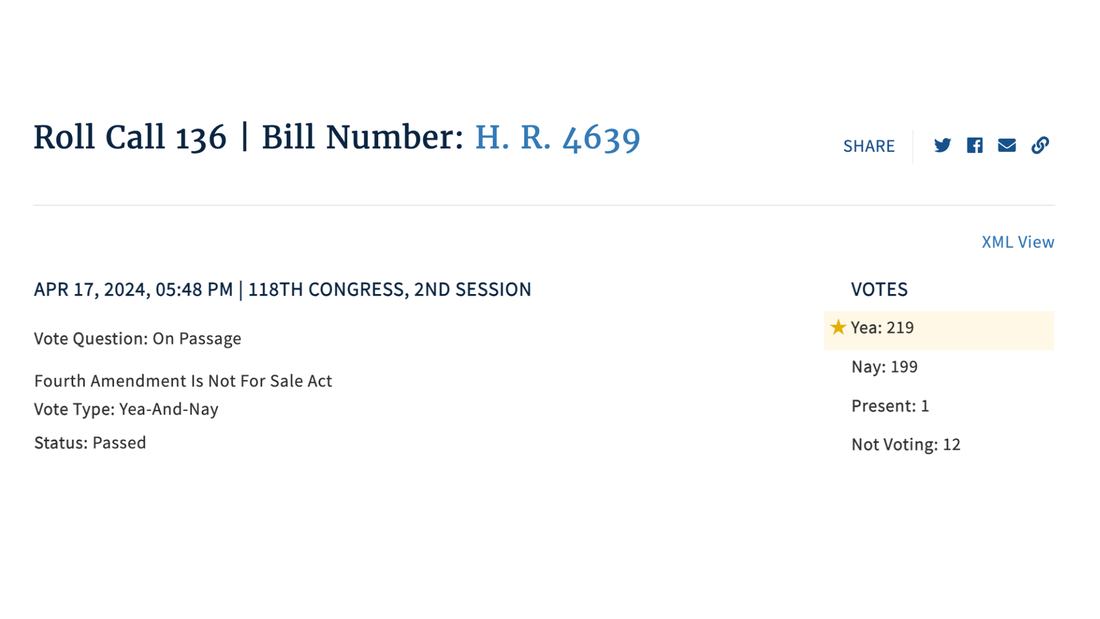
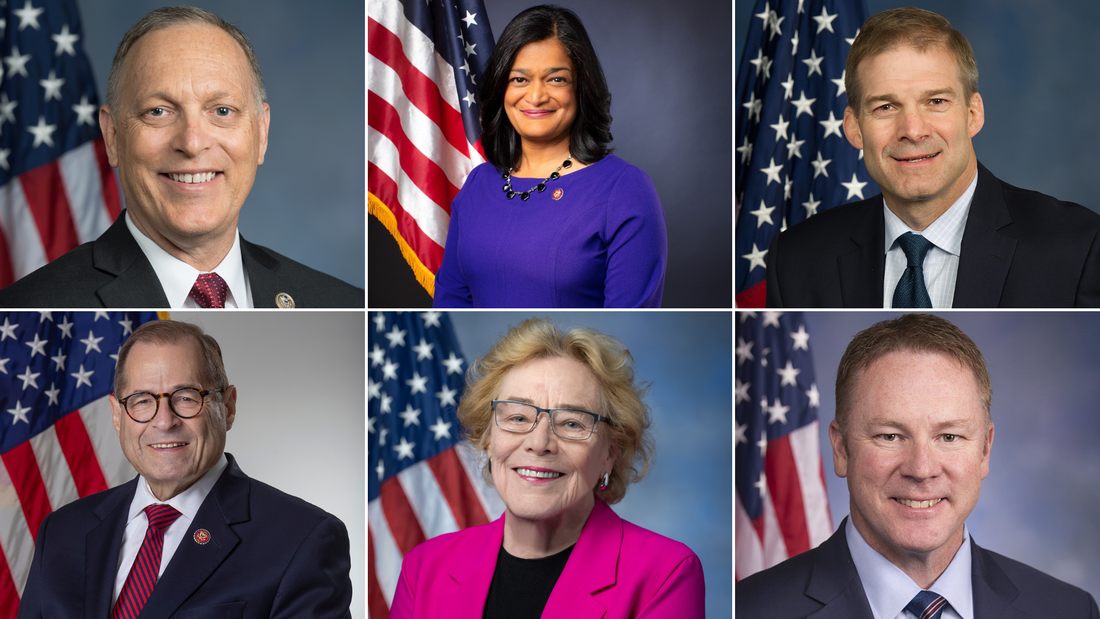
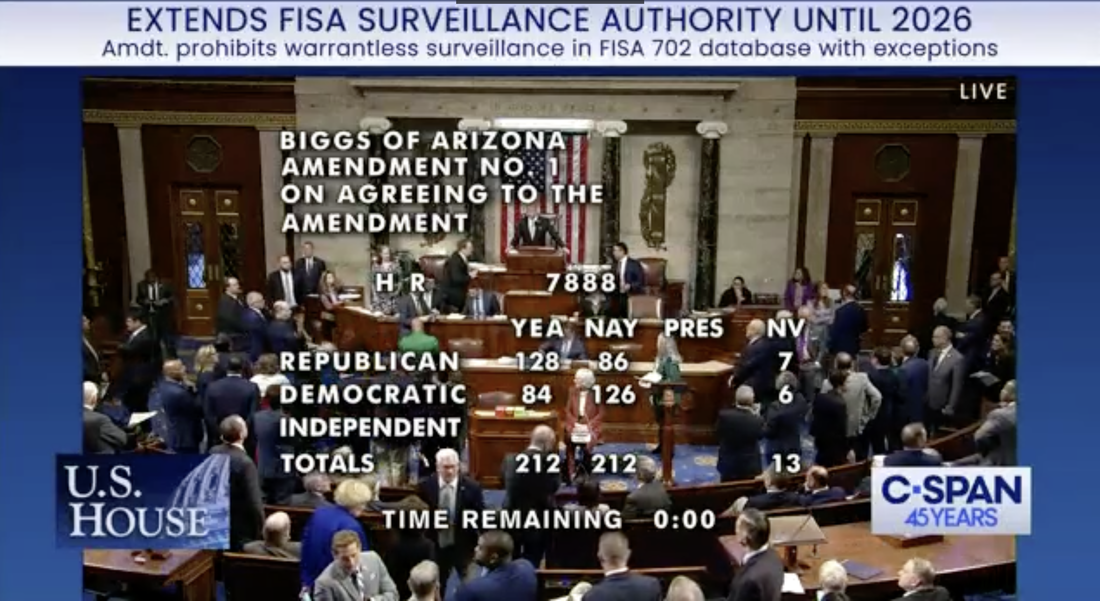
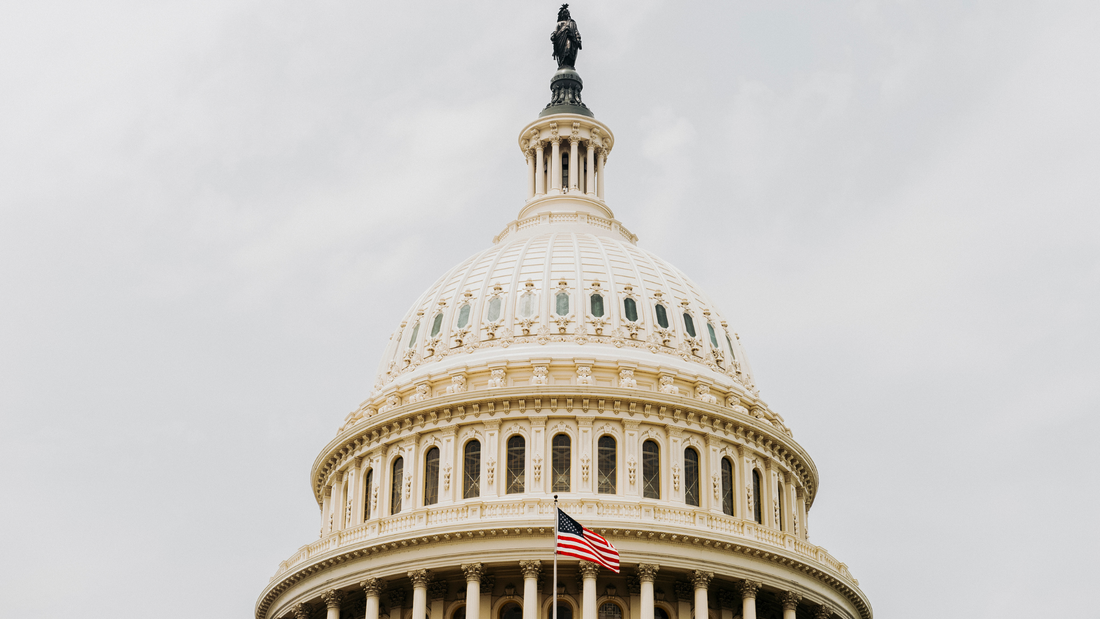
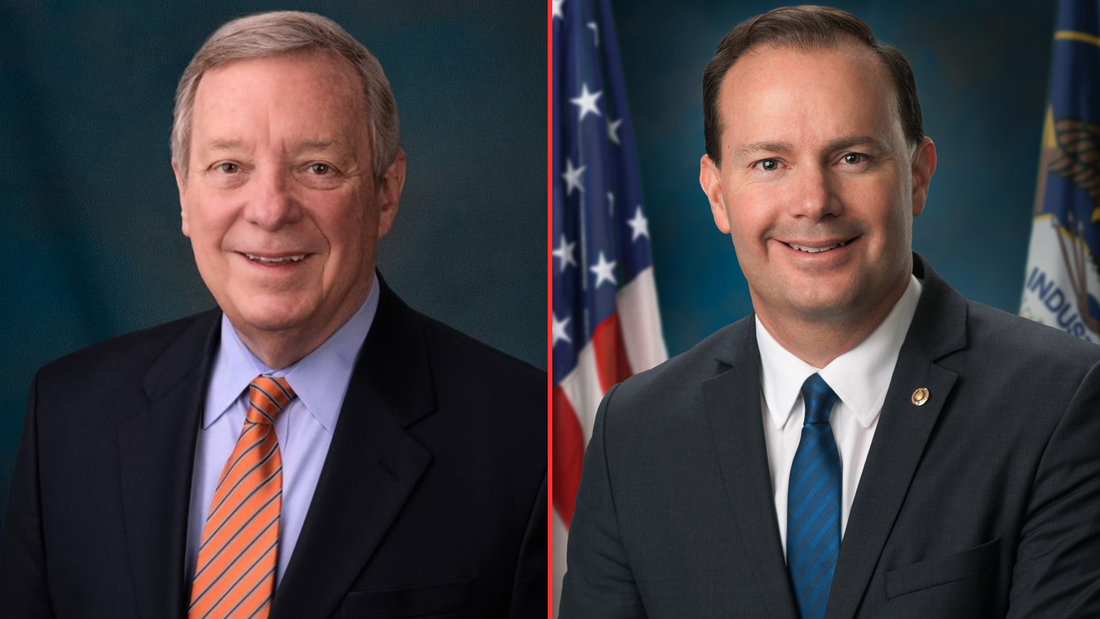
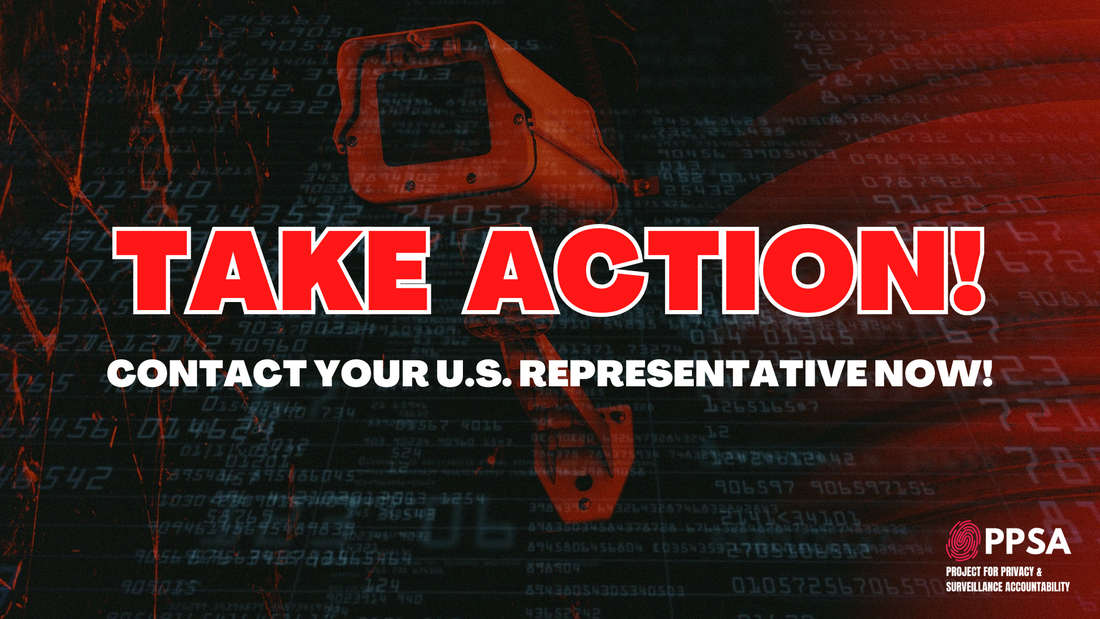
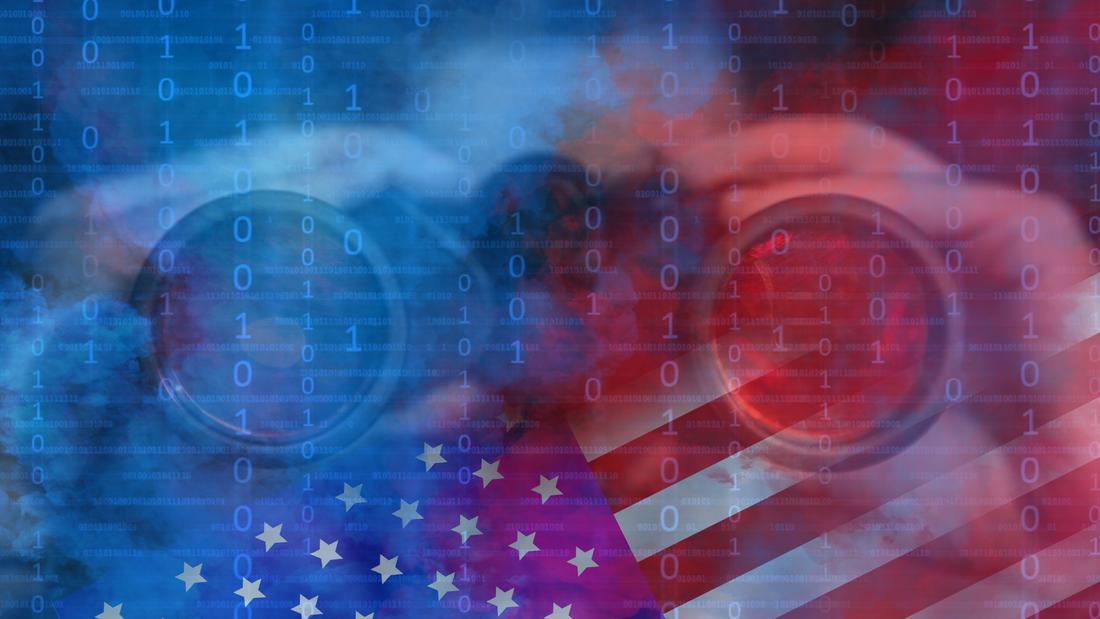
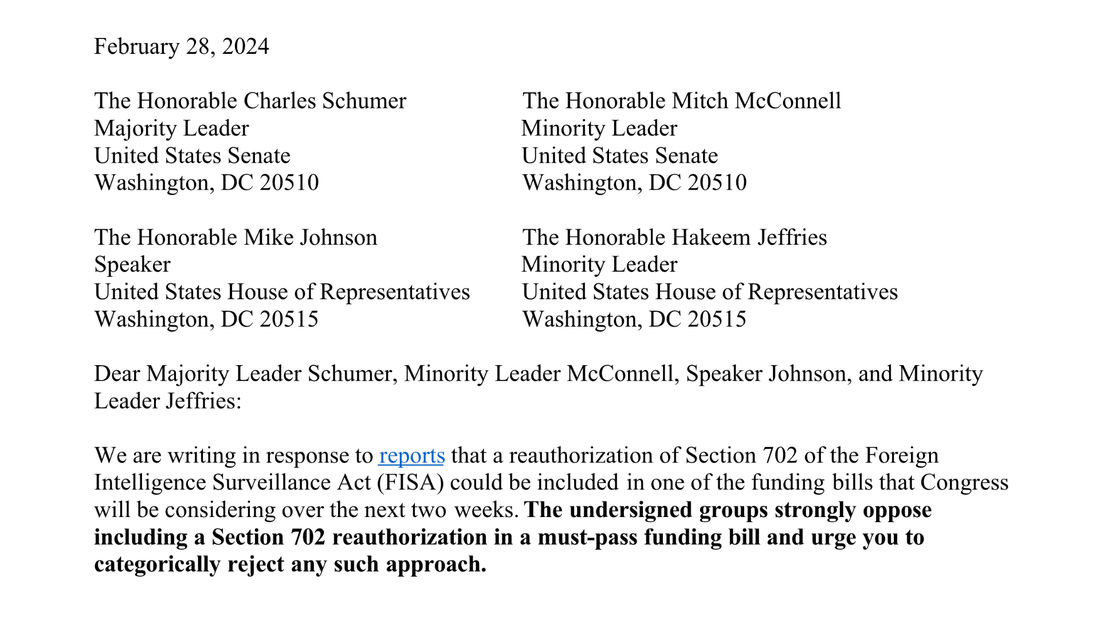
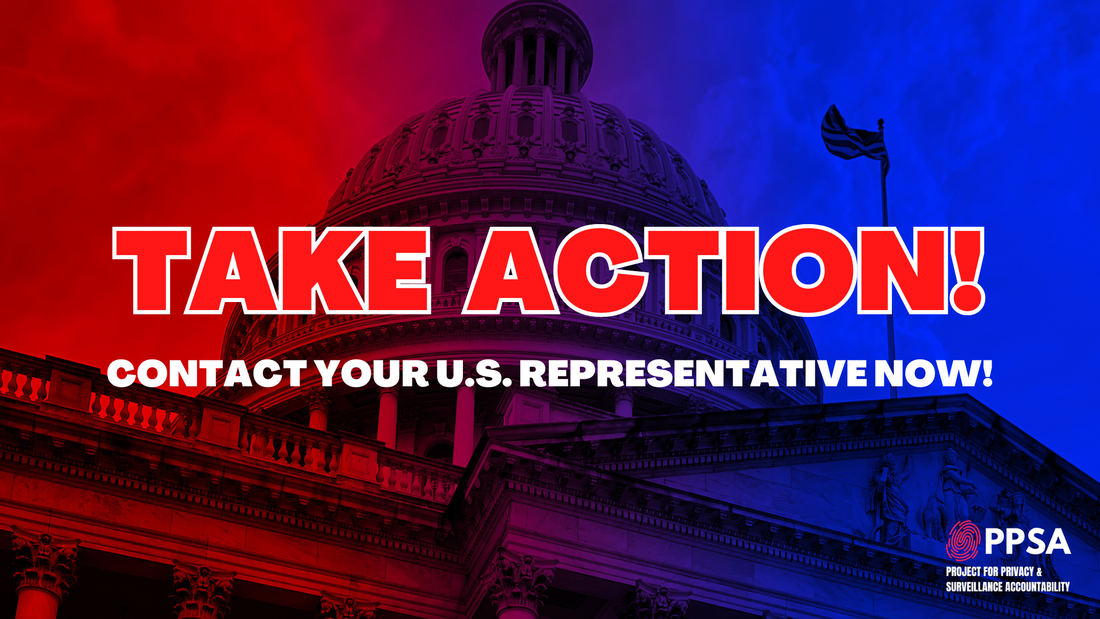
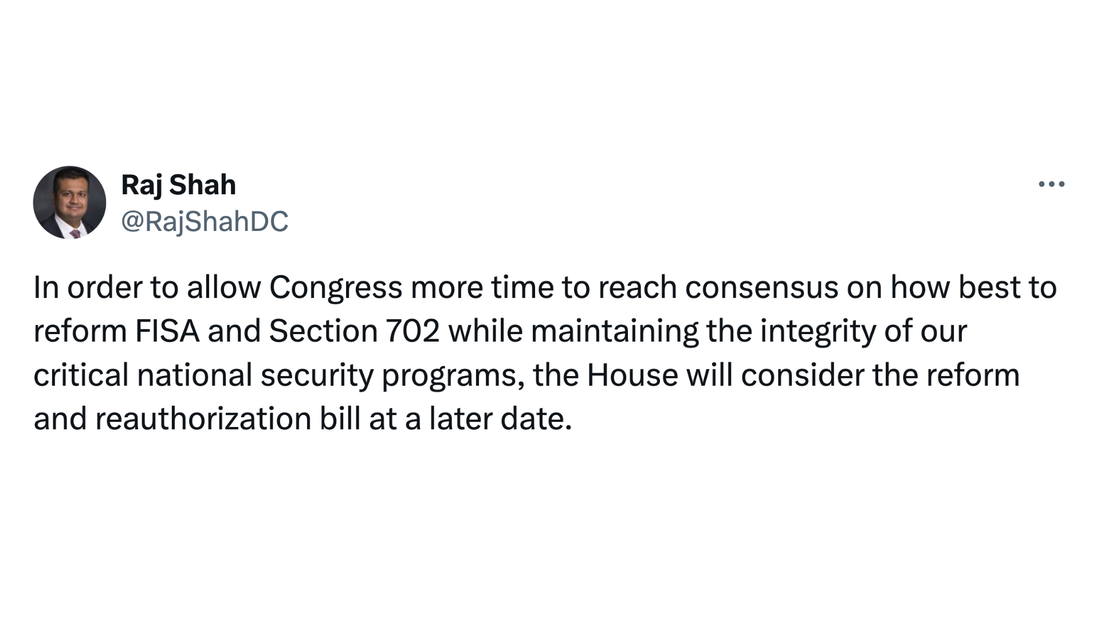

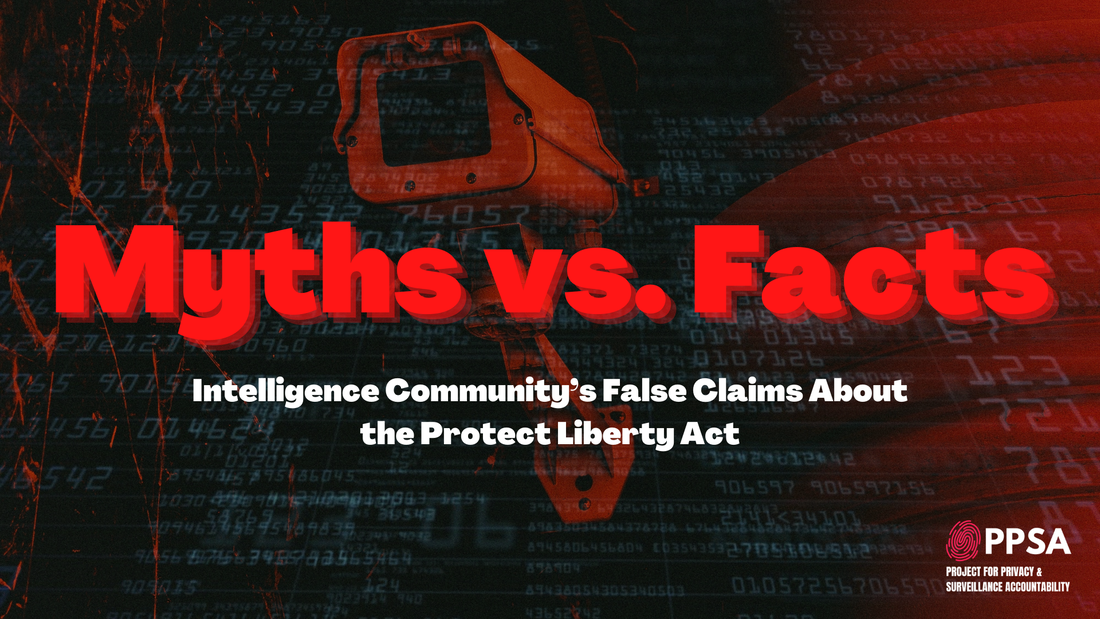
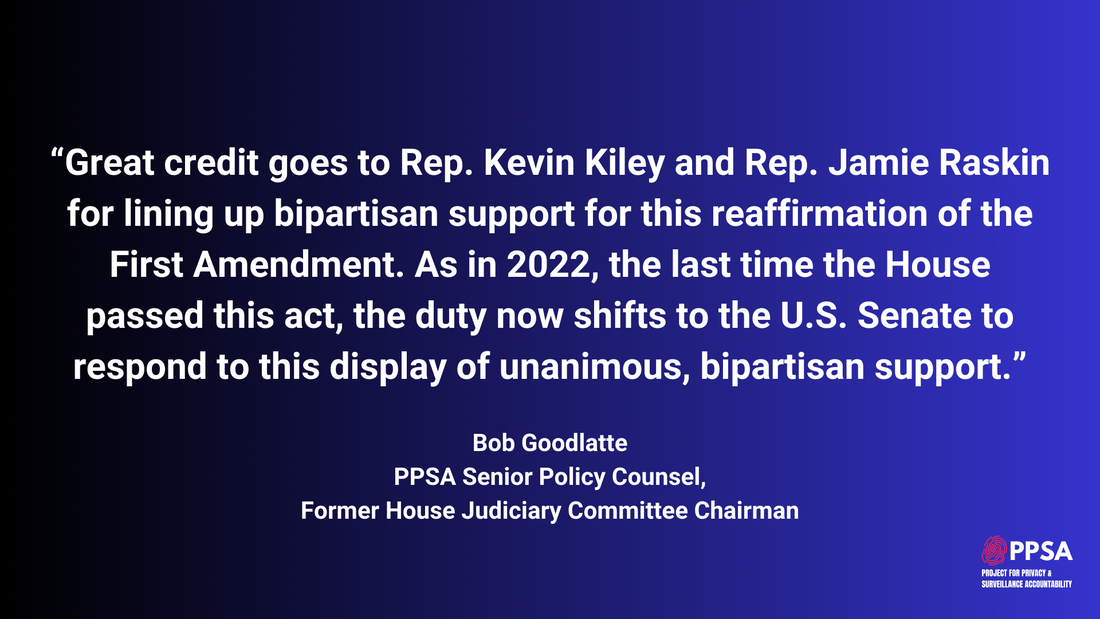

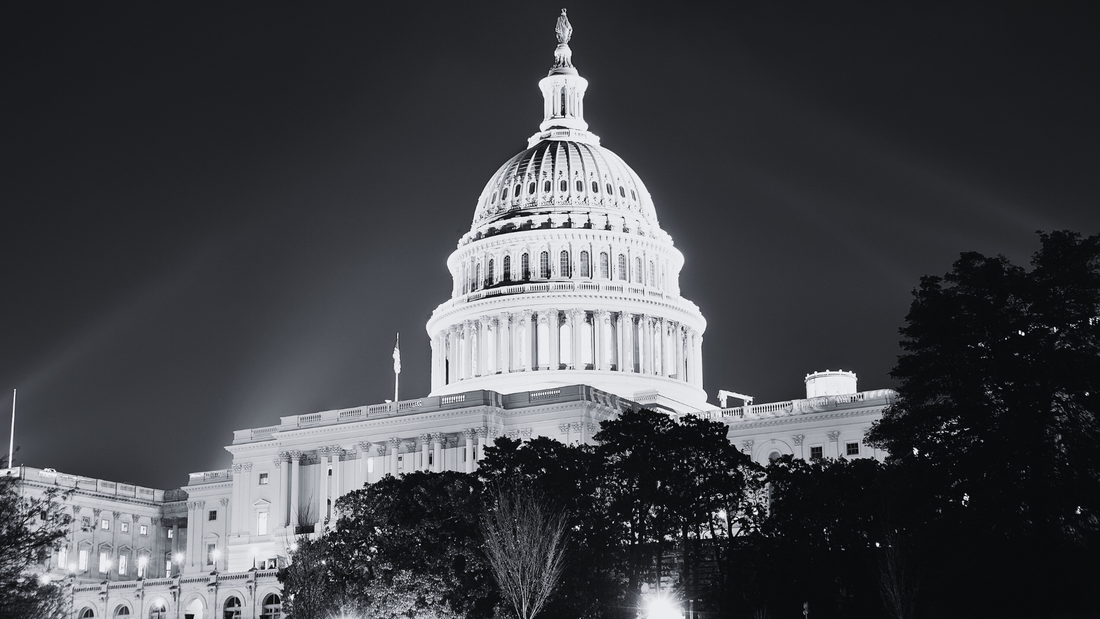
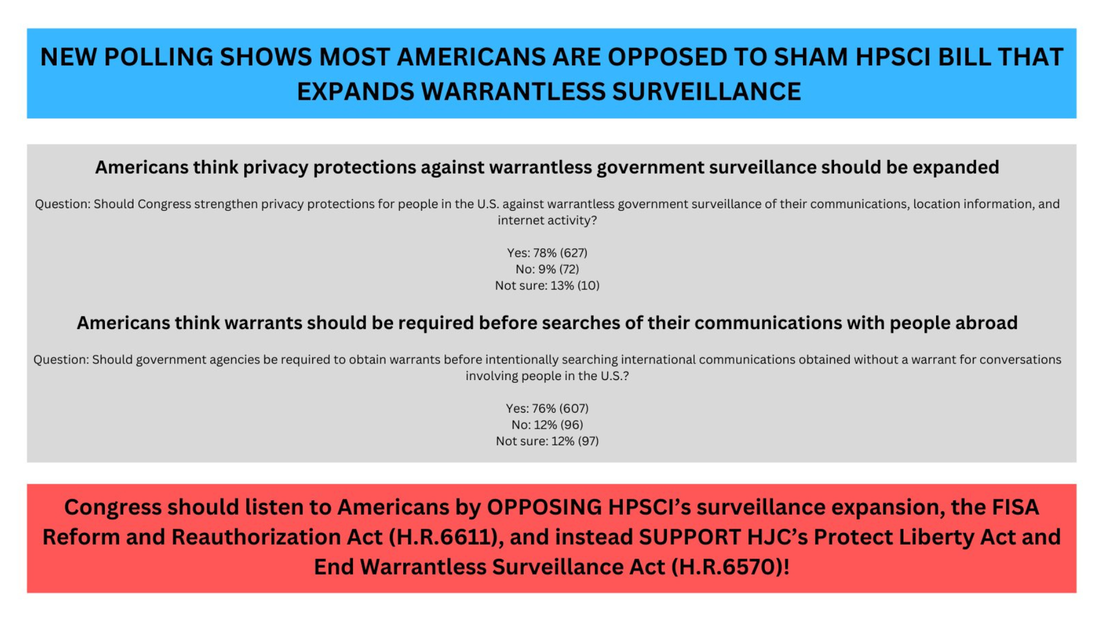
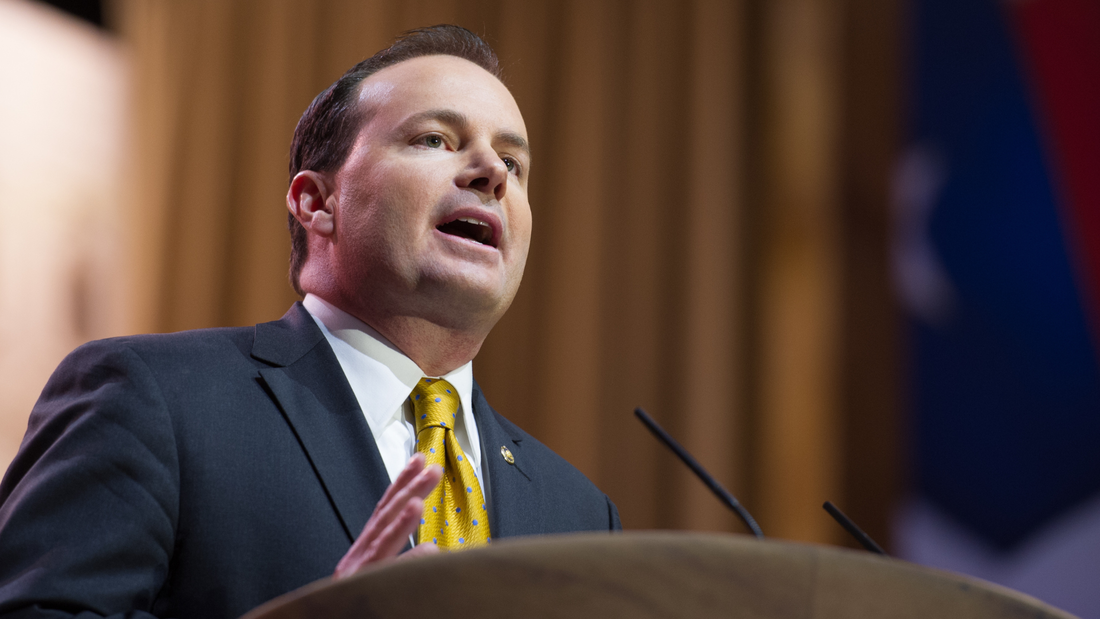
 RSS Feed
RSS Feed